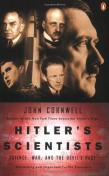BKMT READING GUIDES
Hitler's Scientists: Science, War, and the Devil's Pact
by John Cornwell
Paperback : 592 pages
0 club reading this now
0 members have read this book
A shocking account of Nazi science, and a compelling look at the the dramatic rise of German science in the nineteenth century, its ...
Introduction
Editorial Review
Neither Hitler's rocket blitz of England, nor his use of unprecedented weapons technology, nor--most horrifically--his systematic program of genocide could have been achieved without the purposeful work of Nazi physicists, biologists, mathematicians, and technicians. In Hitler's Scientists, John Cornwell asks:
"Were these cases of Germans behaving according to type as Germans? Or scientists in Germany behaving according to type as scientists?"
These chilling questions encompass two more specific points. First, did the scientists who developed poison gas weapons and concentration camps do it for scientific, personal, or political purposes? Second, can scientists claim to remain objective when funded by, and working for, military or government entities? Cornwell, whose last book was Hitler's Pope, takes a hard line against those scientists who stayed and helped the Nazis after Jewish scientists were expelled and Hitler's plans became clear. With the weight of evidence, Cornwell lays flat the various personal reasons the scientists gave for their actions during the war and shows that even before World War I, German scientists had shown themselves willing to subvert laws and morality in pursuit of money and power. Cornwell also clearly outlines the popular pseudosciences--"racial hygiene," astrology, glacial cosmogony--that drove Hitler's madness. Were there any German scientists who were swept up unknowing or unwilling in the Nazi war machine? It's unclear, but Cornwell's analysis of whether Werner Heisenberg was a "hero, a villain or a fellow traveler" is crucial to that question. Heisenberg's role in the Nazi's inability to complete an atomic bomb is still a riddle, but Cornwell presents all available facts and allows readers to draw their own conclusions. In his last chapters, Cornwell draws parallels between Hitler's scientists and those working in today's world of political anxiety, terrorism, and attacks on basic science. He demolishes once and for all the outdated, disproven, and dangerous notion of scientists working in a vacuum, free of the "taint" of the outside world, and answerable only to their funders. --Therese Littleton
Discussion Questions
No discussion questions at this time.Book Club Recommendations
Recommended to book clubs by 0 of 0 members.
Book Club HQ to over 90,000+ book clubs and ready to welcome yours.
Get free weekly updates on top club picks, book giveaways, author events and more








